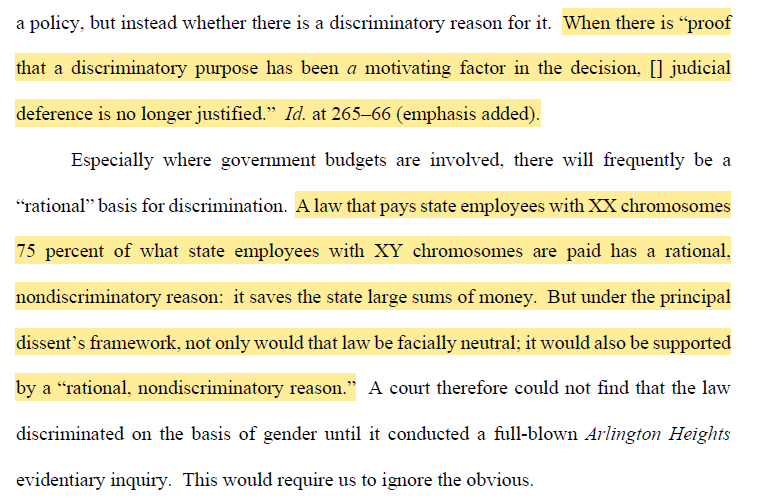National
Disney’s muted response to ‘Don’t Say Gay’ bill riles LGBTQ fans
Calls for boycott as media company declines to speak out
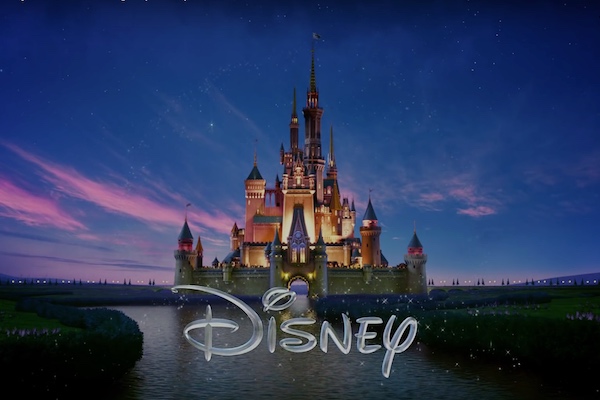
The “Don’t Say Gay” bill faces mounting criticism as it continues to advance in the Florida Legislature and appears headed to the desk of Gov. Ron DeSantis, but one company with strong business ties to the state — despite professing to support the LGBTQ community — has declined to denounce the legislation to the growing disappointment of its many fans.
Disney, the media conglomerate, generates more than $6 billion a year from its theme parks, including the popular Walt Disney World in Florida. The company issued a statement Friday in the face of growing calls to speak out, but the statement is being criticized for stopping short of criticizing the “Don’t Say Gay” bill.
“We understand how important this issue is to our LGBTQ+ employees and many others,” the statement says. “For nearly a century, Disney has been a unifying force that brings people together. We are determined that it remains a place where everyone is treated with dignity and respect. The biggest impact we can have in creating a more inclusive world is through the inspiring content we produce, the welcoming culture we create here and the diverse community organizations we support, including those representing the LGBTQ+ community.”
At the same time, Disney has promoted itself and its theme parks as supporters LGBTQ people, setting aside “Gay Days” for same-sex couples and families specifically to visit the park, as well as its LGBTQ employees. Last year, for example, Disney announced park visitors would be able to buy now-iconic hats with Mickey Mouse ears in rainbow colors, while employees would no longer be held to gender-binary rules on costuming, jewelry, hair, and nail colors.
For 15 consecutive years, Disney has obtained and promoted a perfect score of “100” on the Human Rights Campaign’s annual corporate index, which ranks businesses based on policies and practices for LGBTQ employees, such as workforce protections, partner benefits and transgender-inclusive health care benefits as well as public engagements with the LGBTQ community.
That’s why Disney’s refusal to denounce the “Don’t Say Gay” bill, which would bar Florida schools from “instruction” about sexual orientation or gender identity in grades K-3 and otherwise not at “age-appropriate” levels, comes as a disappointment to many of the company’s fans. Alicia Stella, a video blogger for “Theme Park Stop” who identifies as a member of the LGBTQ community, is quoted in the Orlando Sentinel as saying Disney’s statement was worse than the company not saying anything at all.
“We wanted a statement from Disney because we want Disney to have our backs,” Stella reportedly said. “… It’s worse than a response. This is a non-response.”
The group Gen-Z for Change has gone so far as to issue a call on Twitter to boycott Disney in response to the company’s lackluster response to the “Don’t Say Gay” bill, pointing out the company has made donations to lawmakers supporting the legislation.
“Disney has made it clear that they will not take action to protect the lives of LGBTQ+ youth, and will continue to fund the politicians that seek to oppress them and erase their identities,” the group says. “We are calling on people to #BoycottDisneyPlus until Disney decides to #StopFundingHate.”
Disney is one of the nation’s most recognizable companies and one of the top employers in Florida. In addition to being responsible for Disney characters, the company has under its umbrella of Walt Disney Studios major film-producers Pixar, Marvel Studios, Lucasfilm and 20th Century Studios. Disney also owns the ABC broadcast network and cable television networks such as Disney Channel and ESPN. Had the company denounced the “Don’t Say Gay” bill consistent with its message of supporting LGBTQ people, it would have sent a strong signal that might be a watershed moment in efforts to derail the legislation.
And yet the company has dismissed numerous calls and missed opportunities to articulate a public position on the “Don’t Say Gay” bill. For example, in a joint statement out this week and organized by the Human Rights Campaign and Freedom for All Americans, more than 150 signatories were among the businesses denouncing anti-LGBTQ legislation in Florida as measures that “single out LGBTQ individuals – many specifically targeting transgender youth – for exclusion or differential treatment,” but Disney isn’t among them.
Angela Darra, a spokesperson for Freedom for All Americans, said “we don’t have a relationship with Disney” in response to the Washington Blade’s inquiry last week on why the company was absent, adding she’s unsure if Disney has been approached yet or has a stance either way.
To be sure, the statement itself never explicitly identifies the “Don’t Say Gay” bill and speaks more generally about opposition to anti-LGBTQ legislation advancing in state legislatures. Darra told the Blade “Don’t Say Gay” isn’t enumerated because LGBTQ organizations “take the approach of releasing broader letters like this during state legislative sessions because we believe it is the most effective way to show support from businesses.
“They simply don’t have the capacity or bandwidth to run every individual bill up the corporate ladder for approvals,” Darra added. “I know it’s not ideal but there is a lot of process otherwise that would slow us down.”
The answer for why Disney hasn’t spoken out against the legislation may be the change in leadership. In a detailed article published last week, the Hollywood Reporter lays out how after the previous CEO Bob Iger took a stand on issues, including speaking out against President Trump’s travel ban on Muslim countries, the new CEO Bob Chapek has opted to take a hands-off approach.
“According to a source familiar with both Iger’s and Chapek’s thinking, Iger tended to speak out not only when issues affected the company’s business interests but when they affected its employees, now numbering about 195,000,” the article says. “But this person says Chapek has taken a narrower view and has been concerned that Disney might be viewed as too liberal.”
Other groups have explicitly called on Disney to speak out against the “Don’t Say Gay” bill. Among them is AIDS Healthcare Foundation, which unveiled last week a 30-second ad that aired on local TV stations in Orlando and called on the company to denounce the legislation.
“Disney, where do you stand when we need you the most?” a female voiceover says in the ad. “The rights of families in Florida are under attack. The ‘Don’t Say Gay’ bill is threatening our children’s security. It’s 2022. Kids need knowledge. Depriving them of this is wrong.”
A group of LGBTQ activists wrote a joint letter to Disney last week calling on the company to speak out against the “Don’t Say Gay” bill as well as the Stop Woke Act against critical race theory and legislation restricting transition-related care for transgender youth.
“We understand Disney finds itself having to take public positions on many social issues but believe there is an opportunity to send a powerful signal that companies will not stand for the instrumentalization of LGBTQ+ rights for political purposes,” the letter says.
Signers of the letter aren’t leaders of major LGBTQ institutions, but individual activists and figures, including retired NBA player Jason Collins, former U.S. Rep. Barney Frank (D-Mass.), gay activist David Mixner and HIV activist Sean Strub as well as filmmakers Jason Moore and transgender activist Geena Rocero.
Fabrice Houdart, managing director of the LGBTQ group Out Leadership, organized the letter and told the Washington Blade Disney — as well as other major companies in Florida, such as the Miami Dolphins and the cruise line Royal Caribbean — have commercially engaged with LGBTQ people, including at Pride events, but “have not been present in the response” to the “Don’t Say Gay” bill.
“So we wrote to the CEO of all those companies…saying, ‘Look, you know, if you are a friend of the community, then you have to do something,” Houdart said. “You cannot stay silent were this to be up for a vote in the Senate.”
Houdart said as of last week he had yet to hear anything in response to the letter, but hopes things would change as public pressure on Disney and other companies continues to intensify and corporations become more aware of the legislation.
“What I’m hoping is that internally, they are deciding whether they going to speak out or not,” Houdart said. “But, you know, what I really wanted to do is put them on notice that the community is aware, despite them saying that they are LGBT friendly, they have not taken a stand at the moment where, [it’s another fight against] stigmatization of the community.”
Federal Government
4th Circuit rules gender identity is a protected characteristic
Ruling a response to N.C., W.Va. legal challenges
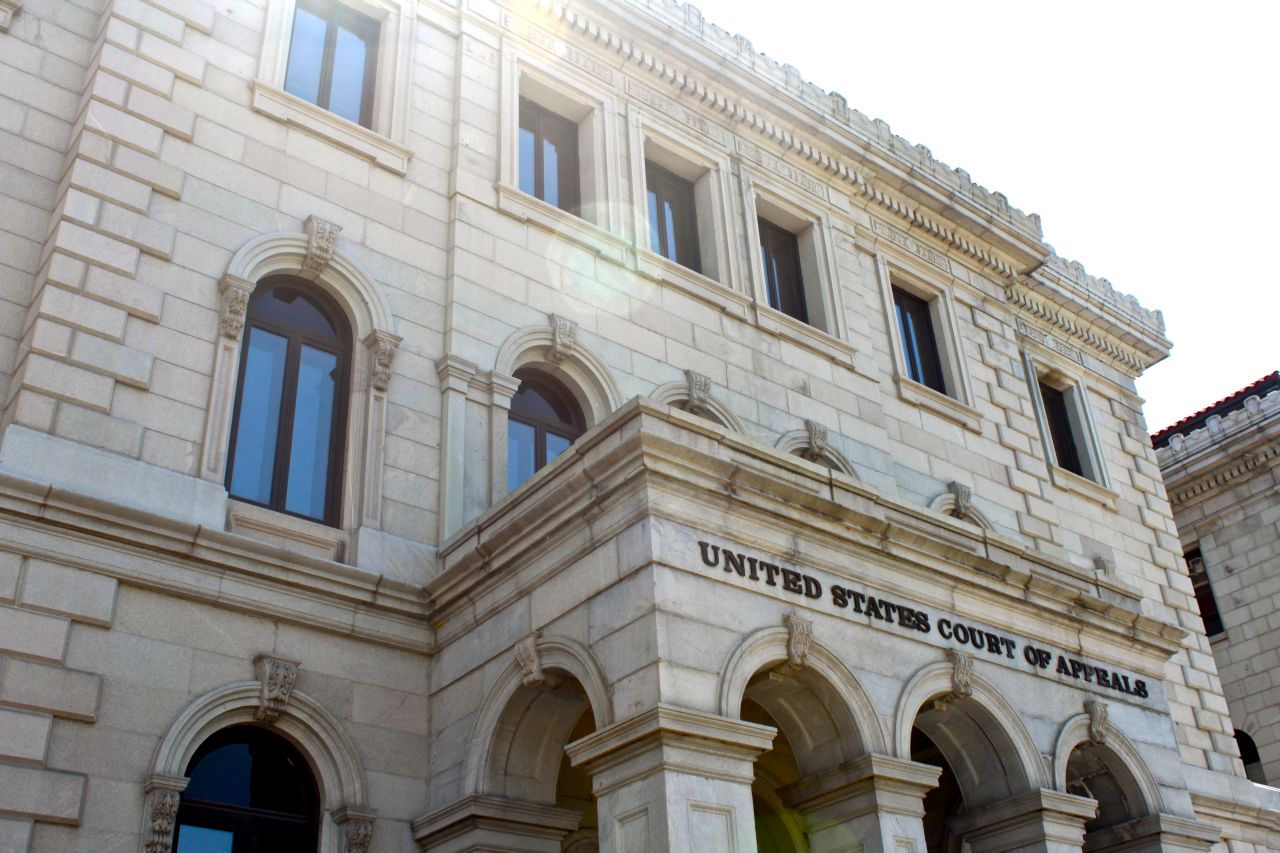
BY ERIN REED | The 4th U.S. Circuit Court of Appeals ruled Monday that transgender people are a protected class and that Medicaid bans on trans care are unconstitutional.
Furthermore, the court ruled that discriminating based on a diagnosis of gender dysphoria is discrimination based on gender identity and sex. The ruling is in response to lower court challenges against state laws and policies in North Carolina and West Virginia that prevent trans people on state plans or Medicaid from obtaining coverage for gender-affirming care; those lower courts found such exclusions unconstitutional.
In issuing the final ruling, the 4th Circuit declared that trans exclusions were “obviously discriminatory” and were “in violation of the equal protection clause” of the Constitution, upholding lower court rulings that barred the discriminatory exclusions.
The 4th Circuit ruling focused on two cases in states within its jurisdiction: North Carolina and West Virginia. In North Carolina, trans state employees who rely on the State Health Plan were unable to use it to obtain gender-affirming care for gender dysphoria diagnoses.
In West Virginia, a similar exclusion applied to those on the state’s Medicaid plan for surgeries related to a diagnosis of gender dysphoria. Both exclusions were overturned by lower courts, and both states appealed to the 4th Circuit.
Attorneys for the states had argued that the policies were not discriminatory because the exclusions for gender affirming care “apply to everyone, not just transgender people.” The majority of the court, however, struck down such a claim, pointing to several other cases where such arguments break down, such as same-sex marriage bans “applying to straight, gay, lesbian, and bisexual people equally,” even though straight people would be entirely unaffected by such bans.
Other cases cited included literacy tests, a tax on wearing kippot for Jewish people, and interracial marriage in Loving v. Virginia.
See this portion of the court analysis here:
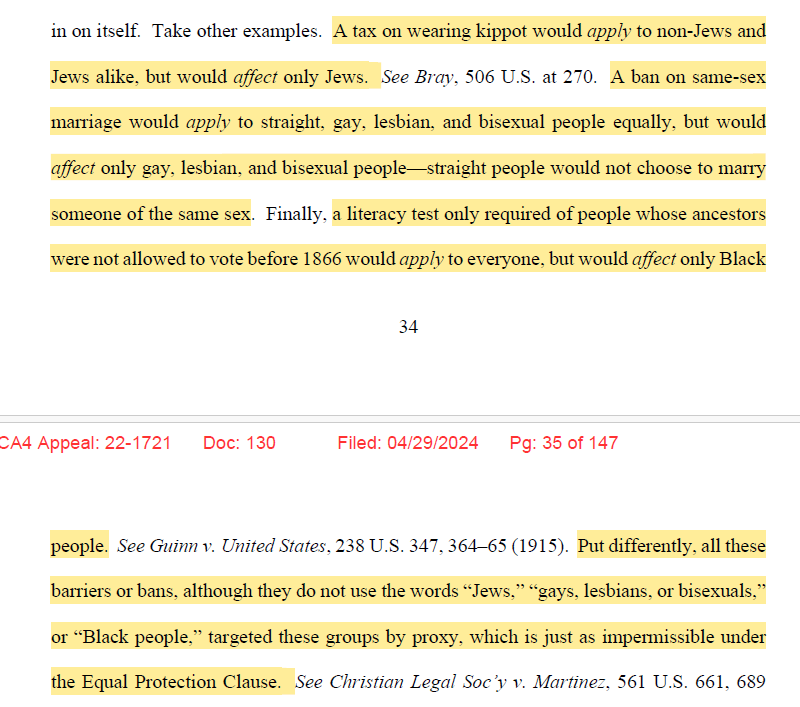
Of particular note in the majority opinion was a section on Geduldig v. Aiello that seemed laser-targeted toward an eventual U.S. Supreme Court decision on discriminatory policies targeting trans people. Geduldig v. Aiello, a 1974 ruling, determined that pregnancy discrimination is not inherently sex discrimination because it does not “classify on sex,” but rather, on pregnancy status.
Using similar arguments, the states claimed that gender affirming care exclusions did not classify or discriminate based on trans status or sex, but rather, on a diagnosis of gender dysphoria and treatments to alleviate that dysphoria.
The majority was unconvinced, ruling, “gender dysphoria is so intimately related to transgender status as to be virtually indistinguishable from it. The excluded treatments aim at addressing incongruity between sex assigned at birth and gender identity, the very heart of transgender status.” In doing so, the majority cited several cases, many from after Geduldig was decided.
Notably, Geduldig was cited in both the 6th and 11th Circuit decisions upholding gender affirming care bans in a handful of states.
The court also pointed to the potentially ridiculous conclusions that strict readings of what counts as proxy discrimination could lead to, such as if legislators attempted to use “XX chromosomes” and “XY chromosomes” to get around sex discrimination policies:
Importantly, the court also rebutted recent arguments that Bostock applies only to “limited Title VII claims involving employers who fired” LGBTQ employees, and not to Title IX, which the Affordable Care Act’s anti-discrimination mandate references. The majority stated that this is not the case, and that there is “nothing in Bostock to suggest the holding was that narrow.”
Ultimately, the court ruled that the exclusions on trans care violate the Equal Protection Clause of the Constitution. The court also ruled that the West Virginia Medicaid Program violates the Medicaid Act and the anti-discrimination provisions of the Affordable Care Act.
Additionally, the court upheld the dismissal of anti-trans expert testimony for lacking relevant expertise. West Virginia and North Carolina must end trans care exclusions in line with earlier district court decisions.
The decision will likely have nationwide impacts on court cases in other districts. The case had become a major battleground for trans rights, with dozens of states filing amicus briefs in favor or against the protection of the equal process rights of trans people. Twenty-one Republican states filed an amicus brief in favor of denying trans people anti-discrimination protections in healthcare, and 17 Democratic states joined an amicus brief in support of the healthcare rights of trans individuals.
Many Republican states are defending anti-trans laws that discriminate against trans people by banning or limiting gender-affirming care. These laws could come under threat if the legal rationale used in this decision is adopted by other circuits. In the 4th Circuit’s jurisdiction, West Virginia and North Carolina already have gender-affirming care bans for trans youth in place, and South Carolina may consider a similar bill this week.
The decision could potentially be used as precedent to challenge all of those laws in the near future and to deter South Carolina’s bill from passing into law.
The decision is the latest in a web of legal battles concerning trans people. Earlier this month, the 4th Circuit also reversed a sports ban in West Virginia, ruling that Title IX protects trans student athletes. However, the Supreme Court recently narrowed a victory for trans healthcare from the 9th U.S. Circuit Court of Appeals and allowed Idaho to continue enforcing its ban on gender-affirming care for everyone except the two plaintiffs in the case.
Importantly, that decision was not about the constitutionality of gender-affirming care, but the limits of temporary injunctions in the early stages of a constitutional challenge to discriminatory state laws. It is likely that the Supreme Court will ultimately hear cases on this topic in the near future.
Celebrating the victory, Lambda Legal Counsel and Health Care Strategist Omar Gonzalez-Pagan said in a posted statement, “The court’s decision sends a clear message that gender-affirming care is critical medical care for transgender people and that denying it is harmful and unlawful … We hope this decision makes it clear to policy makers across the country that health care decisions belong to patients, their families, and their doctors, not to politicians.”
****************************************************************************

Erin Reed is a transgender woman (she/her pronouns) and researcher who tracks anti-LGBTQ+ legislation around the world and helps people become better advocates for their queer family, friends, colleagues, and community. Reed also is a social media consultant and public speaker.
******************************************************************************************
The preceding article was first published at Erin In The Morning and is republished with permission.
National
GLSEN hosts Respect Awards with Billy Porter, Peppermint
Annual event aims to ‘inspire a lot of people to get active’
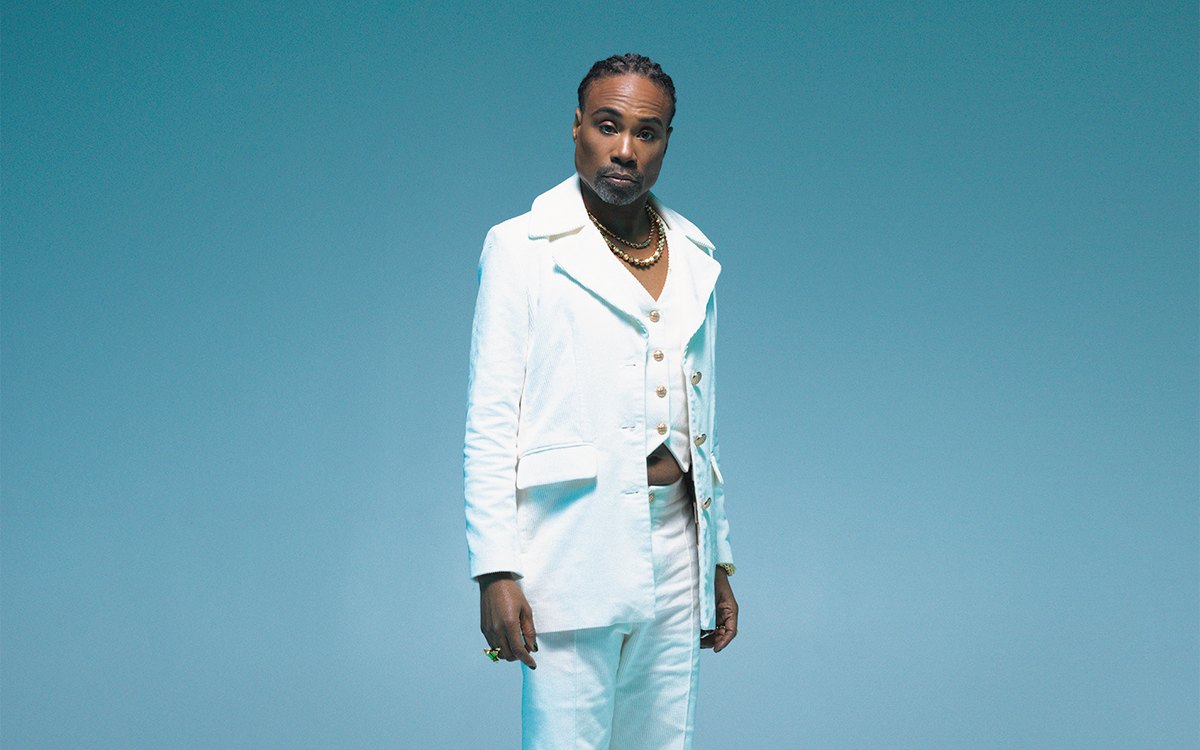
GLSEN will host its annual Respect Awards April 29 in New York, with guests including Miss Peppermint and Billy Porter.
Respect Awards director Michael Chavez said that the event will be moving.
“It will inspire a lot of people to get active and take action in their own communities and see how much more work there is to do, especially with all of the harmful things happening,” he said.
At the event, they will recognize the Student Advocate of the Year, Sophia T. Annually, GLSEN recognizes a student from around the country who is impacting their community.
“Sophia is doing incredible work advocating for inclusive sex education that is LGBTQ+ affirming, working with Johns Hopkins University to implement curriculum.” Chavez said.
Chavez calls the students that attend the Respect Awards the “biggest celebrities” of the evening.
“It is really important for the adults, both the allies and the queer folks, to hear directly from these queer youth about what it’s like to be in school today as a queer person,” he said.
GLSEN is a queer youth advocacy organization that has been working for more than 30 years to protect LGBTQ youth.
“GLSEN is all hands on deck right now, because our kids are under direct attack and have been for years now,” said actor Wilson Cruz.
Cruz is the chair of GLSEN’s National Board, which works to fundraise and strategize for the organization.
“I think we are fundamental to the education of LGBTQ students in school,” he said. “We advocate for more comprehensive support at the local, national, and federal levels so our students are supported.”
Chavez is one of the students that was impacted by this work. He led his school’s GSA organization and worked with GLSEN throughout his youth.
Cruz said Chavez is doing what he hopes today’s GLSEN students do in the future, which is pay the work forward.
“There’s nothing more powerful than people who have experienced the work that GLSEN does and then coming back and allowing us to expand on that work with each generation that comes forward,” he said.
Florida
Homeless transgender woman murdered in Miami Beach
Andrea Doria Dos Passos attacked while she slept
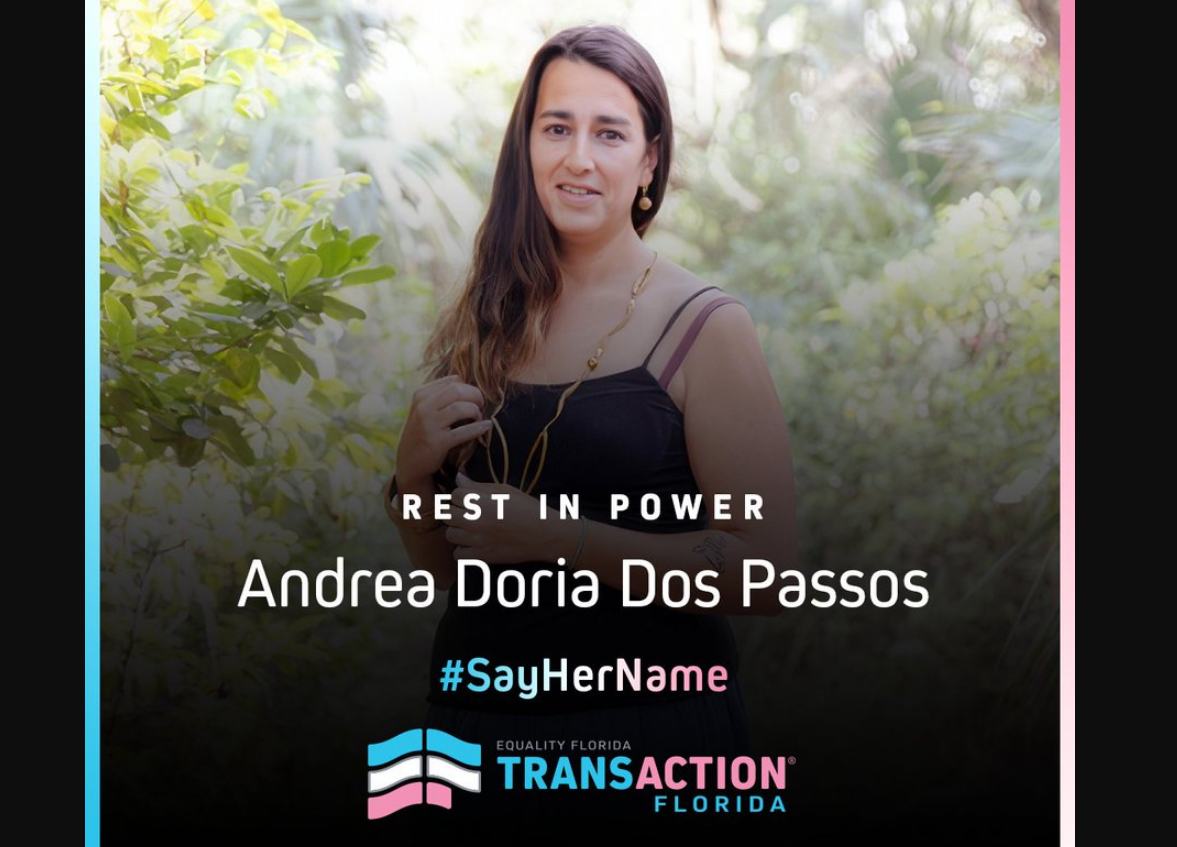
Gregory Fitzgerald Gibert, 53, who was out on probation, is charged with the second-degree murder of 37-year-old Andrea Doria Dos Passos, a transgender Latina woman who was found deceased in front of the Miami Ballet company facility by a security guard this past week.
According to a Miami Beach Police spokesperson the security guard thought Dos Passos was sleeping in the entranceway around 6:45 a.m. on April 23 and when he went to wake her he discovered the blood and her injuries and alerted 911.
She was deceased from massive trauma to her face and head. According to Miami Beach police when video surveillance footage was reviewed, it showed Dos Passos lying down in the entranceway apparently asleep. WFOR reported: In the early morning hours, a man arrived, looked around, and spotted her. Police said the man was dressed in a black shirt, red shorts, and red shoes.
At one point, he walked away, picked up a metal pipe from the ground, and then returned. After looking around, he sat on a bench near Dos Passos. After a while, he got up and repeatedly hit her in the head and face while she was sleeping, according to police.
“The male is then seen standing over her, striking her, and then manipulating her body. The male then walks away and places the pipe inside a nearby trash can (the pipe was found and recovered in the same trash can),” according to the arrest report.
Police noted that in addition to trauma on her face and head, two wooden sticks were lodged in her nostrils and there was a puncture wound in her chest.
Victor Van Gilst, Dos Passos’s stepfather confirmed she was trans and experiencing homelessness.
“She had no chance to defend herself whatsoever. I don’t know if this was a hate crime since she was transgender or if she had some sort of interaction with this person because he might have been homeless as well. The detective could not say if she was attacked because she was transgender,” said Van Gilst.
“She has been struggling with mental health issues for a long time, going back to when she was in her early 20s. We did everything we could to help her. My wife is devastated. For her, this is like a nightmare that turned into reality. Andrea moved around a lot and even lived in California for a while. She was sadly homeless. I feel the system let her down. She was a good person,” he added.
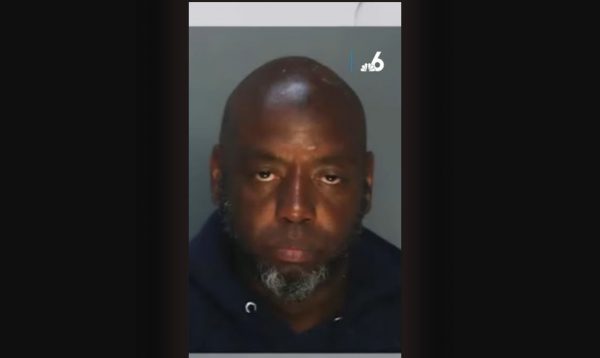
The Miami Police Department arrested Gibert, collected his clothing, noting the red shorts were the same type in the video and had blood on them. Blood was also found on his shoes, according to police. He was taken into custody and charged.
“The suspect has an extensive criminal record and reportedly was recently released from custody on probation for prior criminal charges. Police apprehended the suspect in the city of Miami and the investigation is currently ongoing. This case is further evidence that individuals need to be held accountable for prior violent crimes for the protection of the public. We offer our sincere condolences to the family and friends of the victim,” Miami Beach Mayor Steve Meiner said in a statement.
Joe Saunders, senior political director with LGBTQ rights group Equality Florida, told the Miami Herald that “whenever a transgender person is murdered, especially when it is with such brutality, the question should be asked about whether or not this was a hate-motivated crime.”
-

 South America5 days ago
South America5 days agoArgentina government dismisses transgender public sector employees
-

 Mexico4 days ago
Mexico4 days agoMexican Senate approves bill to ban conversion therapy
-

 Advice4 days ago
Advice4 days agoShould I divorce my husband for the hot new guy in our building?
-

 Maryland3 days ago
Maryland3 days agoMd. governor signs Freedom to Read Act







